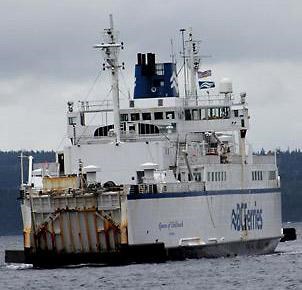An investigation by BC Ferries into the near eight-hour sailing of the Queen of Chilliwack from Powell River to Comox on November 25, 2010 recommends looking into whether a desire to “get home” could have been a factor.
The report acknowledges that “in all likelihood there was a human factor element in the decision to proceed with the crossing” and the fact that the vessel’s home port is in Comox and most of the crew are from Vancouver Island might have influenced the decision to sail. Investigators recommend this practice be looked into to determine whether it is “typical for this route and other routes.”
“There would naturally have been perceived pressure to ‘get home,’” states the report. “This is contradictory to other direction given with regard to severe weather that convenience shall not be a factor in determining whether or not it is safe to sail.”
Passengers and crew spent seven hours and 40 minutes on board the Chilliwack that night seeking refuge off the coast of Texada Island. BC Ferries cancelled two sailings earlier in the day due to extreme weather and a malfunctioning engine, or right angle drive, but made the decision to attempt a sailing at 9:05 pm. As the ship headed into open water the captain determined that the Strait of Georgia was too rough to cross and decided to wait out the weather. The vessel arrived in Little River at 4:45 am.
The report also gives a sequence of events, compiling the details of the journey. Notable is that Captain Geoff Campbell, ship’s master, held two “heavy weather briefings” before making the decision to cross, which included information from Environment Canada. The rolling of the ship, which resulted in minor injuries for three crew members, came after the master stopped the vessel and switched direction. With one of the engines out on that end of the ship it lost course and started rolling.
The report states that, based on crew estimations, the ship rolled “in excess of 20 degrees in each direction with a short rolling period” that consisted of eight to 12 rolls. According to the report the rolling caused three crew members to be injured, two of which resulted in lost time.
Investigators recommend specific guidelines be compiled for sailing in heavy weather, taking into account each berth for each run, the number of engines operable and various wind directions and speeds. Investigators found that neither the Chilliwack nor the Queen of Burnaby have sufficient information or procedures in their Vessel Specific Manuals concerning heavy weather. The report states a process to rectify this “has been initiated” and that risk assessments for both vessels will be carried out.
Weather conditions reported by Environment Canada at the time of the Chilliwack’s departure from Powell River were “well within the parameters to sail,” according to the report. The report does note that current parameters, however, are related only to wave height and not “wind speed, tide, current or the number of operational [engines].”
BC Ferries Executive Vice-President and Chief Operating Officer Mike Corrigan recently replied to a letter from Powell River-Sunshine Coast MLA Nicholas Simons to Transportation and Infrastructure Minister Shirley Bond concerning the sailing. Simons wrote on behalf of constituents questioning the decision to cross and concerned over the way in which BC Ferries kept waiting families informed of the situation. One constituent described being hung up on by BC Ferries while trying to find information.
Corrigan recounted the events of the night to Simons and detailed the ways in which customers were kept informed of the situation. He added that he regrets if anyone felt that BC Ferries “didn’t do enough to communicate” and advised the public to contact the complaints resolution manager, Elke Kite, at 250.978.1185. He noted that there have been “less than half a dozen” complaints about the sailing.



